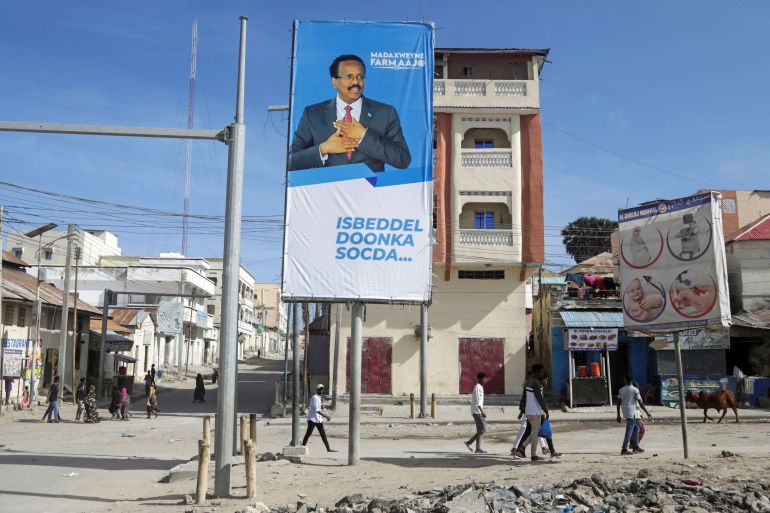Somalia set to hold overdue presidential election
Citing security reasons, police in Somalia announce a curfew in Mogadishu ahead of the long-delayed election.

Somalia is set to hold its long-delayed presidential vote this weekend, ending the convoluted electoral process that raised tensions in the country when the president’s term expired last year without a successor in place.
Authorities have registered 39 presidential candidates for Sunday’s election, a list that includes incumbent Mohamed Abdullahi Mohamed, two former presidents, several top officials, and one woman – Fawzia Yusuf Haji Adam, a legislator who once served as Somalia’s foreign minister.
Keep reading
list of 4 itemsSomalia: Parliament elects new speaker after security standoff
Somalia: AU says Burundi peacekeepers killed in al-Shabab attack
Somalia: Lawmakers to decide president on May 15
The vote will take place amid heightened insecurity as the al-Qaeda-linked armed group al-Shabab, which opposes the federal government, continues to stage lethal attacks in the capital and elsewhere in the Horn of Africa nation.
In recent months, al-Shabab has repeatedly tested the defences of the Halane military camp, which is protected by African Union peacekeepers. A suicide bombing on Wednesday killed at least four people, including two government soldiers, at a checkpoint near the heavily fortified airport area where legislators will meet on Sunday to choose a new president.
At a news conference on Saturday, police spokesman Abdifatah Aden announced a full curfew in the capital, Mogadishu, covering traffic and people, from Saturday at 9pm (18:00 GMT) until Monday at 6am (03:00 GMT).
Lawmakers, security personnel and all others officials involved in the vote are still free to move during those hours.
The indirect election, in which legislators pick the president, will take place at an airport hangar behind blast walls to help fend off potential attacks or meddling by factions within the security services.
The vote is behind schedule by 15 months and Somali authorities faced a May 17 deadline to hold the vote or risk losing key funding from international donors.
President Mohamed – who is also known as Farmaajo – faces a tough battle for re-election. He has been locked in a power struggle with his prime minister, Mohamed Hussein Roble, over control of the government and could play a decisive role in the outcome of the vote.
Despite its persistent insecurity, Somalia has had peaceful changes of leadership in every election since 2000, and it has the distinction of having Africa’s first democratically elected president, Aden Abdulle Osman, to peacefully step down in 1967.
Somalia began to fall apart in 1991, when strongmen overthrew Siad Barre and then turned on each other. Years of conflict and al-Shabab attacks, along with famine, have shattered the country of some 12 million people.
The goal of a direct, one-person-one-vote election in Somalia remains elusive. It was meant to take place this time. Instead, the federal and state governments agreed on another “indirect election”, with legislators elected by community leaders – delegates of powerful clans – in each member state.
All 329 legislators of the bicameral parliament are expected to vote by secret ballot on Sunday. To win in the first round, a candidate must secure two-thirds of the vote, or 219 ballots. Observers expect a second or even third round of voting for the four top candidates.
Mohamed’s four-year term expired in February 2021, but he stayed in office after the lower house of parliament approved a two-year extension of his mandate and that of the federal government, drawing fury from Senate leaders and criticism from the international community.
The poll delay triggered an exchange of gunfire in April 2021 between soldiers loyal to the government and others angry about what they saw as the president’s unlawful extension of his mandate.
Under pressure, Mohamed reversed the term extension and instructed the prime minister to engage with leaders of regional states to chart a new plan for the vote.